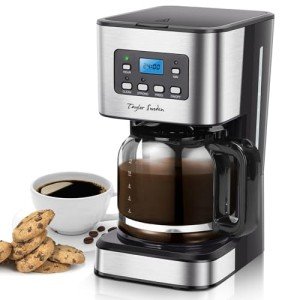The Rise and Reign of Coffee Brewers: A Comprehensive Guide to Brewing Perfection
Coffee is more than just a beverage; it's a ritual that lots of around the world cherish. Whether it's the very first cup to kickstart the day or a mid-afternoon pick-me-up, the method of preparation considerably affects the flavor and general experience of coffee. Coffee brewers have progressed substantially for many years, from traditional drip machines to sophisticated espresso makers, making it necessary for coffee enthusiasts to comprehend the numerous types available and their distinct benefits.
The Evolution of Coffee Brewing Methods
Coffee developing has an abundant history that covers centuries. The approach utilized typically reflects cultural traditions and improvements in technology. Here, we will check out a few of the most prominent coffee brewing techniques, their advantages and disadvantages, and which kind of maker may suit various way of lives and choices.
1. Drip Coffee Makers
The drip coffee maker is one of the most popular developing methods, especially in families and offices.
Pros:
- Simple to utilize: Just include water and coffee premises.
- Ideal for brewing several cups at the same time.
- Constant taste with automatic temperature control.
Cons:
- Limited control over brewing time and temperature.
- Normally requires filtered coffee, which some might find restricting.
2. French Press
The French press, also understood as a press pot or plunger pot, is preferred by numerous for its abundant flavor extraction.
Pros:
- Allows for total control over developing time.
- Produces a thick and flavorful cup of coffee.
- No requirement for paper filters, which is eco-friendly.
Cons:
- Requires more manual effort than automatic machines.
- Can result in sediment in the bottom of the cup.
3. Espresso Machines
Espresso machines vary from manual to fully automated systems designed to produce focused coffee shots.
Pros:
- Versatile: Can make espresso, coffees, lattes, and more.
- Creates rich, vibrant flavors and a silky crema.
Cons:
- Typically more pricey and needs more understanding to operate.
- Cleaning and upkeep can be more complex.
4. Pour-Over Coffee Makers
Pour-over methods like the Chemex and Hario V60 have gained traction for their ability to brew a clean and fragrant cup.
Pros:
- Provides outstanding control over the developing process.
- High-quality taste extraction when done correctly.
Cons:
- Time-consuming and requires skill to ideal.
- Not ideal for producing large amounts.
5. Cold Brew Coffee Makers
Cold brew is made by steeping coarsely ground coffee in cold water, producing a smooth, less acidic drink.
Pros:
- Smooth and revitalizing, with lower level of acidity compared to hot brew.
- Can be made in large batches and kept for days.
Cons:
- Requires sophisticated planning, as steeping can take 12 to 24 hours.
- Some might dislike the distinct taste profile.
| Brewing Method | Pros | Cons |
|---|---|---|
| Drip Coffee Maker | Basic, brews multiple cups | Limited control |
| French Press | Full control, abundant flavor | Manual effort needed |
| Espresso Machine | Versatile, rich flavors | Higher cost and intricacy |
| Pour-Over | Outstanding control, high-quality flavor | Time-consuming, skill-dependent |
| Cold Brew | Smooth, low acidity | Long developing time, unique taste profile |
Choosing the Right Coffee Brewer
When picking a coffee brewer, several factors should be considered:
- Brew Size: How many cups do you usually make simultaneously? For those brewing for a crowd, a drip coffee maker or a larger French press might appropriate.
- Time Commitment: How much time are you ready to devote to developing? If Go At this site is of the essence, automatic machines may be more suitable.
- Flavor Preferences: Do you take pleasure in complex flavors and boldness? An espresso machine or pour-over method might be perfect.
- Budget: High-quality coffee machines can range substantially in cost, so identifying your budget will limit choices.
- Space: Consider the countertop space available in your kitchen area, as some brewers can be rather large.
Frequently Asked Questions About Coffee Brewers
1. How do Compact Coffee Machines clean my coffee maker?
The majority of coffee makers have specific cleansing directions in their handbooks, but easy approaches consist of:
- For drip coffee machine: Run an option of vinegar and water through the brew cycle followed by clean water.
- For French presses: Disassemble the plunger and clean it under hot water utilizing a soft sponge.
2. How frequently should I change my coffee maker?
Normally, coffee machine can last anyw here from 5 to 10 years with correct care. If you observe a decline in the taste of your coffee or persistent problems with performance, it may be time for a replacement.
3. Can I utilize regular coffee with an espresso machine?
Yes, you can utilize regular coffee, however it will not yield the same concentrated taste profile as using espresso roast coffee specifically created for such machines.
4. What is the best coffee-to-water ratio for developing?
A basic guideline is the "Golden Ratio" of 1:16, which is one part coffee to 16 parts water, but experimentation might lead you to your personal preference.
5. Are pricey coffee makers worth it?
Higher-end coffee machine often have much better develop quality, more features, and supply much better taste control. However, "worth it" can be subjective based on specific requirements and spending plan.
The range of coffee brewers readily available today allows enthusiasts to explore and try out tastes, methods, and developing times, making every cup an unique experience. Whether selecting an easy drip machine or mastering the art of espresso developing, the journey of producing the ideal cup of coffee continues to develop. By comprehending the various brewing methods and their attributes, individuals can make informed decisions that improve their day-to-day coffee routine and appreciation. After all, the best brewer can make all the difference in enjoying that much-loved cup of joe.

